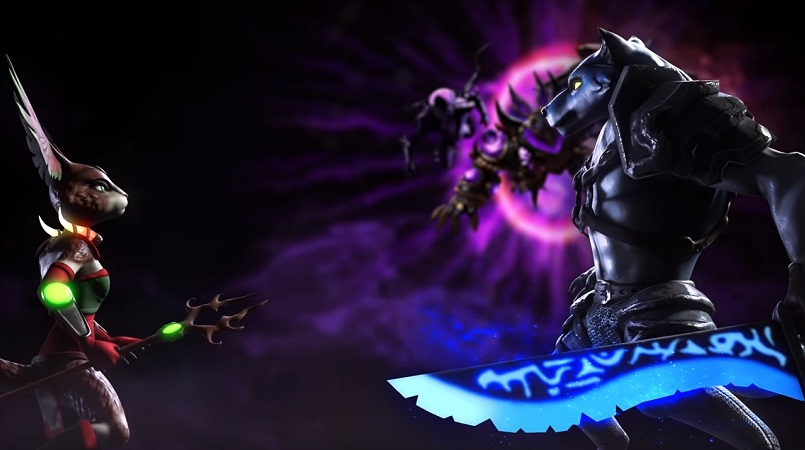Automotive heads-up displays are a recent fad that has been well received. With technology becoming faster more reliable, the use and acceptance of technology…
Why we invested in Augmentors game – Llew Claasen, Vinny Lingham [Updated]

Assembling a team with the right skills has been a key challenge in the development of the Augmentors game, which claims to be the world’s first augmented reality blockchain-based mobile game, says Silicon Valley based SA entrepreneur and investor Vinny Lingham.
The game is set to launch this quarter, following a soft launch in August.
“From an investment perspective, we have to make sure that we have the best team working on every project, so it was integral that we took our time to put together the dynamite team we have today,” said Lingham, who together with Newtown Partners managing partner Llew Claasen is a key investor in the game.
Augmentors initially pitched on television programme Shark Tank and raised $1-million from an initial coin offering (ICO) which ran between January and February last year.
Ahead of its expected full launch later this quarter, Lingham and Claasen — responded to questions on the development of the game and their views on augmented reality.
Created by Michael Deon, Augmentors was borne out of the desire to have an augmented reality character as a friend when he was 11 years old. Michael co-founded Augmentors with Kyle Haffenden in 2015, and in 2017 Gert Kruger was appointed CEO.
As Augmentors is built on the blockchain, it allows you to collect an army of powerful and rare creatures that you have true ownership of, meaning once you’ve trained your asset through battles, you can sell and trade them as you wish.
How did the project first get on your radar as investors?
Vinny Lingham: In 2016 I was a Shark on Shark Tank South Africa, and Augmentors was one of the startups looking for investment.
Michael Deon and Kyle Haffenden presented their demo, and the main hook of their pitch was bringing socialisation back into gaming, creating true rarity of the creatures and using upcoming augmented reality tech. I was intrigued by their idea, and felt that we could create something really special by incorporating blockchain technology into their initial game idea.
Llew Claasen: As Newtown Partners, we’ve always invested in companies that are forward-thinking and on the cutting-edge of their respective fields, even before the blockchain element was introduced, Augmentors as a concept still fitted into that parameter.
By combining our experience in blockchain and cryptocurrency, with Michael and Kyle’s idea, we’ve managed to take the game to the next level and we all see the potential it holds.
Why did you feel so strongly about the team adding a blockchain element to the game?
VL: Two of the biggest challenges in gaming is true ownership of game assets and provable scarcity. These challenges are ones that can be solved using the blockchain. While non-fungible or unique token standards hadn’t emerged when we made this investment, I knew blockchain had to be a part of this game to solve for these issues.
Industry progress in this space has been great with a dominant Ethereum standard, ERC-721, for non-fungible tokens emerging in 2018; the standard that Augmentors will use for their assets.
The benefits of ERC-721 include true ownership, provable scarcity and inter-game operability. I expect ERC-721 to unlock a digital collectibles boom.
Is investing in an AR blockchain game different from your other investments?
LC: While this is the only game in our portfolio, it maintains a common thread with our other investments — blockchain technology startups that have the potential to become globally competitive tech projects.
To give some context, two of our other recent investments include a blockchain-based fintech solution for emerging markets and a blockchain-based decentralised identity management platform.
How far along is the Augmentors project now?
LC: The game will be launching in select countries in Q4 this year. As part of the token sale, we sold extremely rare God creatures — only 17 of each will ever be available.
The last time we checked in with the community regarding these tokens, they were selling at 2BTC each, and that’s before the game has even launched. We’re looking forward to seeing the impact the live game will have on these very scarce tokens and to grow the Augmentors economy as a whole.
What have some of the biggest challenges been?
LC: Llew Claasen: Working with new technology always presents challenges, but the way we see it — by being on the forefront, these challenges present as unique opportunities for growth and innovation.
And this rings true for Augmentors, the team has to make sure they’re tweaking the code to be in-line with new tech releases like AR-kit and AR-core as well as token standards; and while this is challenging from a timeline perspective, it allows us to push the boundaries to ensure that the end product is unique, competitive and has the greatest chance of success.
VL: With this project we have two challenges with finding resources — first of all finding people with the correct skill set has been a challenge, and on top of that finding people that are comfortable working in a startup environment means that those already limited numbers are depleted.
From an investment perspective, we have to make sure that we have the best team working on every project, so it was integral that we took our time to put together the dynamite team we have today.
What are your views on augmented reality and its future potential?
VL: The year 2018 has already been dubbed as the breakout year for AR, and there are experts that predict that 2019 will be even more so, and I tend to agree.
According to a research report by New Gen Apps, the AR/VR gamer market is set to grow to 216 million by 2025 and the overall user market will hit the 1-billion mark by 2020.
Revenue from AR is projected to be as much as four times as high as that of VR by 2020, with AR expected to generate around $120 billion and VR only $30 billion, according to Digi-Capital. (Digi-Capital Managing Director Tim Merel subsequently told Ventureburn that AR is however forecast to reach $85-billion to $90-billion in revenue and VR $10-billion to $15-billion revenue by 2022)
AR is the future for many applications, and even though game-play may be one of the first real use cases, from a commercial and investment perspective, AR has big possibilities for long-term growth.
There’s gaining momentum around using AR in medical education where students will learn via a 3D holographic anatomy program that would allow them to see virtual cadavers but also allow a deeper dive into the human body.
There are also a few strong use cases within the retail sector, such as implemented AR/VR stores, where shoppers will never need to go into a real store – all purchases could be done through the app.
I believe that once we’ve seen a few real applications of the tech in these expected areas, as well as in gaming and marketing, we’ll see an even bigger explosion of interest and investment. We’re on the cusp of seeing a completely new industry and way of doing everyday things, and we’re excited to be at the forefront.
Read more: EXCLUSIVE: Augmentors reveal launch date of AR, blockchain mobile game
Read more: Five SA angel investors you want to meet
Read more: Local blockchain-based AR game nears funding goal
Editor’s note (12 October 2018): Digi-Capital Managing Director Tim Merel subsequently alerted Ventureburn that the figures used by Vinny Lingham for projected revenue from AR and VR were incorrect.
He said rather that Digi-Capital forecasts AR to reach $85-billion to $90-billion in revenue and VR $10-billion to $15-billion revenue by 2022.
Featured image: Screengrab from Augmentors game trailer (Augmentors Game via Youtube)

